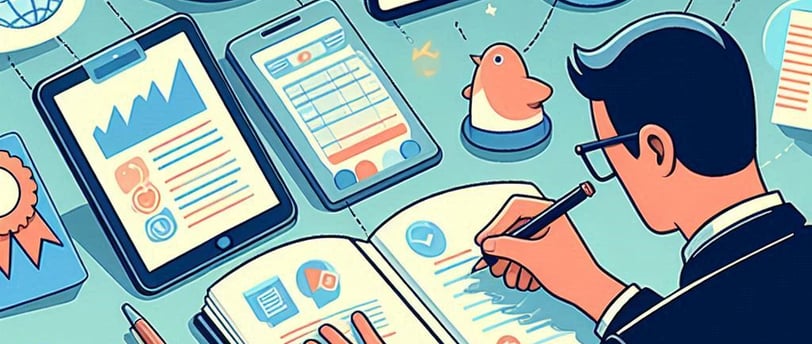The Mirror of Self-Reflection: How Self-Analysis Can Change Your Life
Self-analysis is a powerful tool for personal and professional growth. By taking time to reflect, you gain clarity, improve decision-making, and develop healthier relationships. The key is consistency—regular self-reflection leads to continuous improvement.
SELF-HELP
kanav pareek
2/11/20255 min read


Have you ever paused to truly understand yourself? In our fast-paced world, we often focus on external achievements while neglecting inner reflection. Self-analysis is the key to unlocking personal growth, helping us understand our emotions, behaviors, and thought patterns. By taking time to reflect, we can make better decisions, enhance relationships, and achieve our goals with clarity.
Self-analysis is more than just self-criticism—it's about understanding our strengths and weaknesses to evolve into better versions of ourselves. In this article, we'll dive deep into the importance of self-analysis, effective techniques, and how it can shape different aspects of life.
What Is Self-Analysis?
Self-analysis is the process of examining one's thoughts, emotions, and behaviors to gain a deeper understanding of oneself. It involves honest reflection on personal experiences, strengths, weaknesses, and values.
Unlike self-criticism, which focuses on flaws and mistakes, self-analysis is a balanced approach that acknowledges both strengths and areas for improvement. When done correctly, it leads to self-awareness, better decision-making, and emotional intelligence.
Key Aspects of Self-Analysis
Self-reflection – Looking back at experiences to understand patterns
Self-awareness – Recognizing emotions, strengths, and weaknesses
Personal evaluation – Assessing actions and their consequences
By practicing self-analysis, we gain clarity on who we are and what drives us, ultimately leading to a more fulfilled life.
Why Is Self-Analysis Important?
Self-analysis is a powerful tool for personal and professional growth. Here’s why it matters:
1. Enhances Self-Awareness
Understanding yourself allows you to recognize emotional triggers, strengths, and weaknesses. This awareness helps in making better life choices.
2. Improves Decision-Making
When you analyze past decisions, you gain insights into what works and what doesn’t. This makes future decision-making more informed and strategic.
3. Aids in Personal Growth
Self-analysis helps identify areas for self-improvement, whether in communication, time management, or emotional control.
4. Strengthens Relationships
When you understand your emotions and reactions, you communicate better, leading to healthier relationships with family, friends, and colleagues.
5. Boosts Mental Health
By analyzing negative thought patterns, you can challenge and replace them with positive ones, reducing stress and anxiety.
The Psychological Aspect of Self-Analysis
Understanding the psychology behind self-analysis helps make it more effective.
1. The Role of Introspection
Introspection allows you to assess your internal thoughts and emotions. It’s the foundation of self-analysis, promoting deeper understanding.
2. Influence of Cognitive Biases
Sometimes, our minds trick us into seeing things differently than they actually are. Cognitive biases can distort self-perception, making objective self-analysis difficult.
3. Emotional Intelligence and Self-Awareness
High emotional intelligence (EQ) allows you to process emotions effectively. Self-awareness, a key component of EQ, helps manage thoughts and behaviors.
Methods of Self-Analysis
There are multiple ways to engage in self-analysis. Here are some effective methods:
1. Journaling
Writing down thoughts helps organize and analyze emotions. Journaling allows you to track patterns over time.
2. Meditation and Mindfulness
Practicing mindfulness helps in staying present, reducing overthinking, and increasing self-awareness.
3. Seeking Feedback from Others
Sometimes, others see things we miss about ourselves. Constructive feedback from friends, mentors, or colleagues can provide valuable insights.
4. Personality Tests and Self-Assessments
Tools like the Myers-Briggs Type Indicator (MBTI) or Enneagram can help in understanding personality traits and behaviors.
Self-Analysis for Personal Growth
Self-analysis isn’t just about understanding yourself—it’s about evolving.
1. Identifying Strengths and Weaknesses
Knowing your strong points can boost confidence, while recognizing weaknesses allows for improvement.
2. Setting Personal Goals
When you understand yourself, you can set goals aligned with your values and aspirations.
3. Overcoming Limiting Beliefs
Self-reflection helps in identifying negative beliefs that hold you back, allowing you to replace them with empowering ones.


How Self-Analysis Affects Mental Health
Self-analysis plays a crucial role in mental well-being. By understanding yourself better, you can improve your emotional resilience and reduce stress. Here’s how:
1. Reducing Anxiety and Stress
When you take time to reflect, you can identify the sources of your stress and anxiety. This awareness allows you to develop coping mechanisms, such as relaxation techniques or shifting perspectives.
2. Understanding Emotional Triggers
Self-analysis helps you recognize patterns in your emotions and behaviors. For example, if you frequently feel irritated in certain situations, reflecting on why this happens can help you address the root cause.
3. Promoting Self-Compassion
Often, people are their own harshest critics. Through self-analysis, you can learn to treat yourself with the same kindness and understanding that you would offer a friend.
Common Challenges in Self-Analysis
While self-analysis is beneficial, it’s not always easy. Many people struggle with:
1. Fear of Facing the Truth
Self-reflection can bring up uncomfortable realizations. However, growth comes from acknowledging and addressing these truths rather than avoiding them.
2. Overthinking and Self-Doubt
There’s a fine line between productive self-analysis and excessive rumination. Overanalyzing past mistakes can lead to unnecessary self-doubt and anxiety.
3. Lack of Consistency
Self-analysis should be a regular practice, not a one-time activity. Many people start strong but fail to maintain the habit.
How to Overcome Barriers to Effective Self-Analysis
To make self-analysis more effective, consider the following strategies:
1. Developing a Growth Mindset
Instead of seeing mistakes as failures, view them as learning opportunities. A growth mindset encourages continuous self-improvement.
2. Practicing Self-Compassion
Don’t be too harsh on yourself. Accept that everyone has strengths and weaknesses, and focus on progress rather than perfection.
3. Finding the Right Balance
Self-reflection should be constructive, not overwhelming. Set aside specific time for self-analysis rather than overthinking every action throughout the day.
Self-Analysis in Career Development
Understanding yourself can significantly impact your professional life. Here’s how self-analysis benefits career growth:
1. Aligning Personal Values with Professional Goals
Knowing what you truly want from your career helps in making choices that align with your values and passions.
2. Enhancing Leadership Skills
Great leaders practice self-awareness. By analyzing their strengths and weaknesses, they become more effective in guiding others.
3. Adapting to Workplace Challenges
Self-analysis allows you to handle stress, feedback, and workplace dynamics with a clear and objective mindset.
The Role of Self-Analysis in Relationships
Your ability to analyze yourself also impacts how you interact with others. Here’s how self-analysis strengthens relationships:
1. Improving Communication Skills
Understanding your communication style helps you express yourself clearly and effectively.
2. Understanding Emotional Needs
By recognizing your own emotional needs, you can communicate them better to others and also respect their needs.
3. Resolving Conflicts Effectively
Self-aware individuals can manage conflicts with empathy, leading to healthier relationships.
Tools and Techniques for Effective Self-Analysis
If you’re unsure how to start self-analysis, try these tools:
1. SWOT Analysis for Personal Development
Strengths – What are you naturally good at?
Weaknesses – Where do you struggle the most?
Opportunities – What areas can you improve on?
Threats – What external factors hold you back?
2. Mind Mapping for Goal Setting
Visualizing your goals and connecting them to actionable steps helps in clearer self-assessment.
3. Daily Reflection Exercises
Spend 5-10 minutes each night reflecting on the day’s experiences. Ask yourself:
What did I do well today?
What could I have done differently?
What did I learn about myself?
Real-Life Examples of Self-Analysis
Many successful individuals attribute their growth to self-analysis. Here are some inspiring examples:
1. Elon Musk’s Continuous Improvement Approach
Musk is known for constantly analyzing his performance, learning from failures, and making strategic adjustments to improve.
2. Oprah Winfrey’s Reflection and Mindfulness
Oprah attributes much of her success to self-reflection and journaling, which helped her understand her emotions and decisions better.
3. Michael Jordan’s Self-Evaluation for Excellence
Jordan frequently reviewed his performance, identified areas for improvement, and worked relentlessly to perfect his skills.
Final Thoughts: Becoming Your Best Self
Self-analysis is a powerful tool for personal and professional growth. By taking time to reflect, you gain clarity, improve decision-making, and develop healthier relationships. The key is consistency—regular self-reflection leads to continuous improvement.
Start today with small steps—write in a journal, seek feedback, or practice mindfulness. Over time, these habits will transform you into a more self-aware, confident, and fulfilled individual.
FAQs
1. How often should I practice self-analysis?
It depends on your goals, but ideally, a brief daily reflection and a deeper analysis every week can be beneficial.
2. What is the best way to start self-reflection?
Journaling, meditation, and asking yourself thought-provoking questions are great starting points.
3. Can self-analysis help with overcoming bad habits?
Yes! Understanding why you engage in certain behaviors makes it easier to replace them with healthier habits.
4. How can I differentiate between self-analysis and overthinking?
Self-analysis is structured and purposeful, while overthinking is repetitive and unproductive. Having a clear focus helps avoid excessive rumination.
5. Is there a specific tool recommended for beginners?
Journaling and SWOT analysis are great beginner-friendly tools for self-reflection.
Blog
Content
Engage
contact@growthtimewithme.com
© 2024. All rights reserved.
